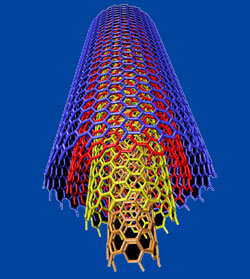An innovative study by Tel Aviv University that combines biochemistry and engineering to create nanotechnological devices was selected as one of the outstanding articles in 2007 in the Journal of Micromechanics and Microengineering of the British Institute of Physics (IOP)

Innovative research by Tel Aviv University that combines biochemistry and engineering to create nanotechnological devices was selected as one of the outstanding articles in 2007 in the Journal of Micromechanics and Microengineering of the British Institute of Physics (IOP).
The article, based on the research work of the student Nir Sofer, describes a collaboration between the groups of Dr. Yael Hanin from the Faculty of Engineering and Prof. Ehud Gazit from the Faculty of Life Sciences at Tel Aviv University. The research, which combines an understanding of the self-construction ability of nanometric structures from a biological source and the engineering production of devices, is an important step towards the integration of peptide nanotubes in devices that are serially produced using manufacturing techniques of the microelectronics industry.
The research work of Nir Sofer, under the direction of Dr. Hanin, examined the conditions and demonstrated the ability to integrate the nanotubes into a variety of nanometric devices. The essential issues presented in the article are the limitations in applying the standard processes in the construction of standards that include these tubes, and the ways to circumvent them. This while examining the composition and structure of the tubes. For the first time, methods were presented that integrate the tubes into the conventional manufacturing processes, and the use of methods developed for the inclusion of the tubes in several micro/nanometric electromechanical systems (MEMSNEMS) was even demonstrated.
Peptide nanotubes are nanometer structures that were recently developed in the research laboratory of Prof. Gazit, and which are formed spontaneously from a simple molecule, no more complex than the peptide sweetener aspartame, which is produced in quantities of many tons every year. Accordingly, these building blocks are simple and cheap to create, and at the same time have many properties that may position them as preferred nanotechnology building blocks. Applications such as biosensing, and nanoscale flow can take full advantage of the tubes' biocompatibility and chemical flexibility, while other applications can benefit from their use as templates for nanometer metal wires.
The production methods required and which were successfully developed in this work, may be a milestone in the integration of biological elements in devices with nanometer characteristics. Also, the presented methods provide the basics required for the electrical characterization of the peptide tubules. With the help of these methods, the ability to create nanometric flow devices and even nano-fluidic channel based transistors (nano-fluidic channel based transistor) in which the nanotubes play the central role was demonstrated. These and similar elements could be used as the main components in Lab-on-a-chip devices that are expected to be used as a convenient, cheap and fast replacement for long and tedious medical laboratory work that requires a large amount of sampled material. In addition, electrical components based on nanotubes were presented, which were used as a template and sheath for nanometer silver wires. All of this as evidence of the ability of the tubes to be used as building blocks in the nanometric electromechanical systems presented and in other systems.
The original article:
Integrating peptide nanotubes in micro-fabrication processes
NB Sopher, ZR Abrams, M Reches, E Gazit and Y Hanein
J. Micromech. Microeng. 17 No. 11 (November 2007) 2360-2365
The score by the newspaper:
http://www.iop.org/EJ/journal/-page=extra.highlights2007/0960-1317

2 תגובות
very impressive!!!
Well done. More the better!